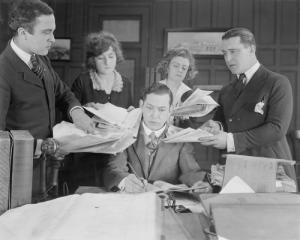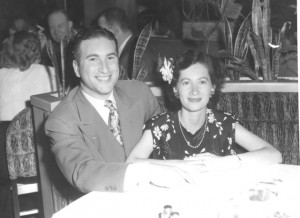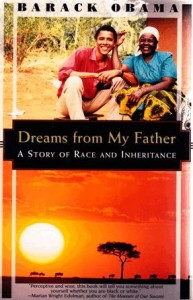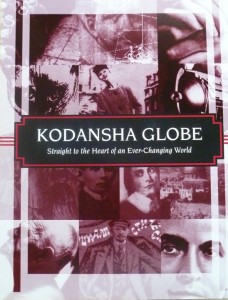If It Must Be Done–A Model for Laying Off People Decently
 As a longtime publishing staffer who was let go in a major layoff at Sterling Publishing more than three years ago, when downsizing at publishing houses is announced, I read the notices with a combination of concern and regret for the folks losing their jobs, now colleagues of mine in the forced evacuation from the ranks of corporate publishing. It’s analogous to reading the New York Times obituaries to learn who’s recently died, before looking at any other section of the paper. This is not schadenfreude*, pleasure derived from the suffering of others, but something more its opposite–there ought to be a word for the vicarious experience of misery alloyed with empathy upon learning that still more people will soon be joining the ranks of the unemployed, the disemployed, and for how long it cannot be known.
As a longtime publishing staffer who was let go in a major layoff at Sterling Publishing more than three years ago, when downsizing at publishing houses is announced, I read the notices with a combination of concern and regret for the folks losing their jobs, now colleagues of mine in the forced evacuation from the ranks of corporate publishing. It’s analogous to reading the New York Times obituaries to learn who’s recently died, before looking at any other section of the paper. This is not schadenfreude*, pleasure derived from the suffering of others, but something more its opposite–there ought to be a word for the vicarious experience of misery alloyed with empathy upon learning that still more people will soon be joining the ranks of the unemployed, the disemployed, and for how long it cannot be known.
Readers of this blog may recall that in an essay entitled Three Years Ago Today I’ve written about the day in 2009 when I was laid off as Editorial Director of Sterling’s Union Square Press. Covertly summoned to the office of the HR director Denise Allen, she and my supervisor Jason Prince were waiting for me with grim faces. After they lowered the boom, they “asked” me to leave the office later that day for the last time. “Asked” was really a euphemism for “demanded.” Any personal items I could not grab that day–and I had a substantial work and reference library in my office–would be boxed up and shipped to me, they said. I returned to my office in shock to find that I had already been denied access to my work email.
I do know why HR professionals claim that this is the safest way to let people go, lest a dismissed employee make the survivors uncomfortable in the now-shadowy presence of a person who an hour earlier was a colleague; deride the company in the presence of remaining staff or make off with company secrets; or go ‘postal’ and harm higher-ups and co-workers. What’s more, Sterling is owned by Barnes & Noble, a publicly traded company, and during my Sterling tenure B&N was hyper-averse to news and publicity they couldn’t control–even denying book editors the ability to trumpet their latest acquisitions in industry newsletters like Publishers Lunch without first having the announcements vetted by corporate PR. During my Sterling tenure, this aversion to unwanted publicity even extended to the fact that B&N declined to name people who lost their jobs in layoffs, nor was the number of people let go ever confirmed. However, much as negative consequences from treating people decently may be feared, I believe that what this behavior does instead is subtract at least a bit of humanity from everyone in the equation. I note ruefully, but again without any satisfaction, that Jason Prince was himself laid off from Sterling earlier this year. I take no pleasure in this turnabout, and wonder if he was himself on the receiving end of such lousy treatment the day he learned of his dismissal.
With the above as personal prologue, I note with regret that HarperCollins yesterday announced a reorganization of their Sales Department that will lead to the elimination of the positions of at least five senior employees. But there was something novel about the press release put out by Harper’s President of Sales Josh Marwell**–the degree to which he names, acknowledges, and even thanks the people who are losing their jobs. The entire text ran in galleycat.com. The mensch-like passage reads:
After 18 years at HarperCollins, Jeff Rogart, VP, Director of Distributor Sales will retire at the end of August. Jeff’s unique combination of deep industry knowledge, direct style and kind charm has earned him the respect and love from colleagues both inside and outside the company. He will be truly missed. I regret to announce as a result of these changes that Ken Berger, Mike Brennan, Mark Hillesheim, Kathy Smith and Jeanette Zwart, our respected and beloved colleagues will be leaving the company on July 20th. Please join me in thanking them for their hard work, true dedication and warm collegiality in the countless contributions they have made to our company. We wish them only the best in the future.
When you get laid off you invariably, unavoidably, experience a kind of professional death. The process of being shown the door is sort of like getting ferried to the other side, but the process that put me on the boat across my personal River Styx was not as kind or forgiving as the ferryman Charon was with his passengers. And yet, you might say that over the past three and a half years rather than going where the souls of the departed reside, I’ve pretty much managed to be reborn professionally, not buried. That though would be a story for another post. For now, I just want to say I wish Jeff Rogart well in his retirement, and that I feel really bad for Ken Berger, Mike Brennan, Mark Hillesheim, Kathy Smith and Jeanette Zwart, the latter whom I have known personally over the years. I wish them well on their journey into post-corporate life, no matter how brief or long-lived, and assure them that if they ever want to consult with me about my experience of it, I will be glad to share whatever practical advice and insight I can muster. I’m relieved that Josh Marwell and HarperCollins named them, that they were praised and given the professional courtesy they are due, and that under lousy circumstances their dignity was preserved and that their departure will not be so rushed or precipitous as mine. I cannot comment of course on the terms of severance under which they’re leaving the company–I hope they were generous–but as for announcing layoffs, this is a model for how to do it right.
*For an insightful discussion of schadenfreude and related words, I refer you to this excellent blog post by musician and songwriter Zak Claxton.
**Full disclosure: I have known Josh Marwell for more than thirty years, since he was a sales rep to my Cleveland bookstore, Undercover Books, representing St. Martin’s Press. We have not discussed the current matter.



 My now sadly gone parents–Earl Turner beaming and his pretty wife Sylvia Shiff Turner, with a gardenia in her hair. They were on a trip in June 1948 from Cleveland, to Niagara Falls and Hamilton, Ontario, in Canada, and to Detroit. The Turners liked Canada even then. Happy Mothers Day!
My now sadly gone parents–Earl Turner beaming and his pretty wife Sylvia Shiff Turner, with a gardenia in her hair. They were on a trip in June 1948 from Cleveland, to Niagara Falls and Hamilton, Ontario, in Canada, and to Detroit. The Turners liked Canada even then. Happy Mothers Day!


